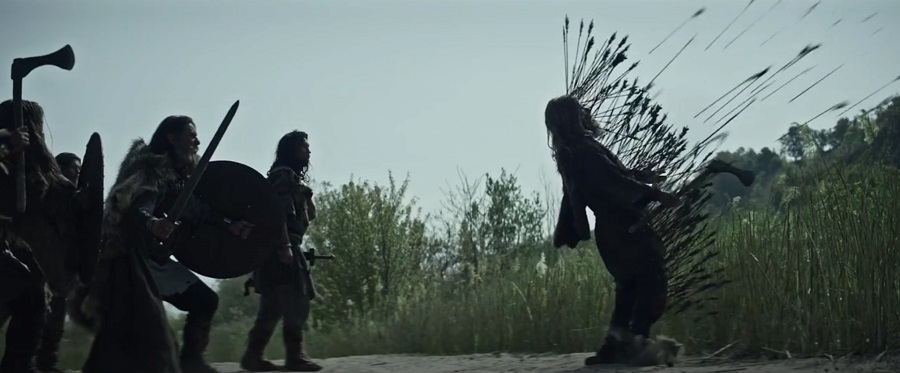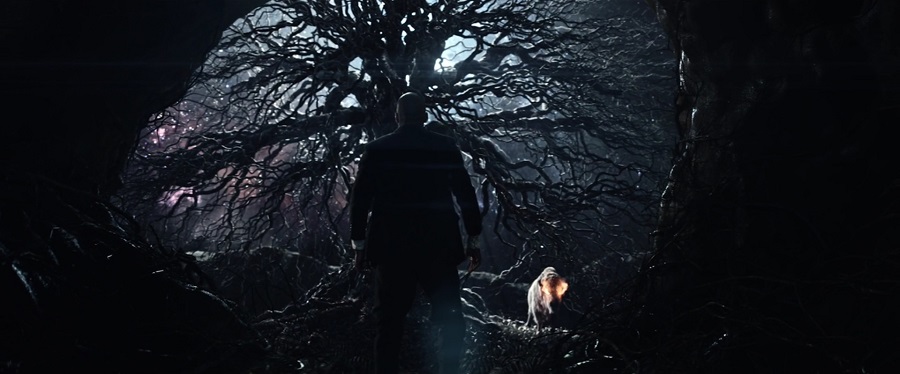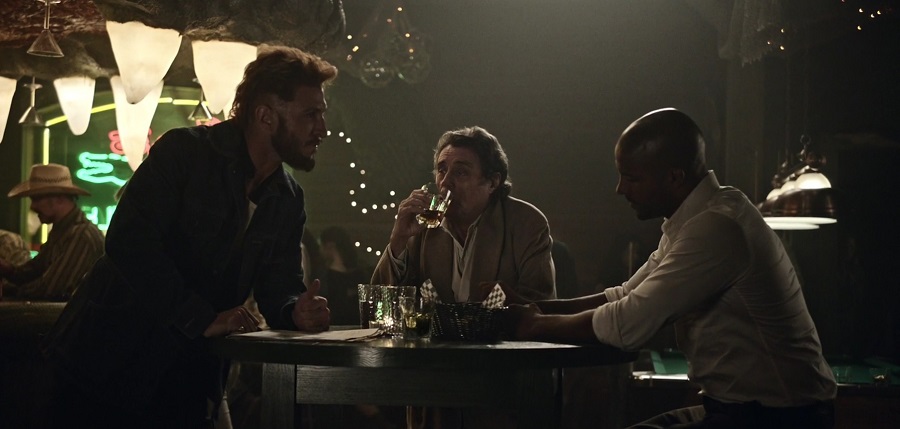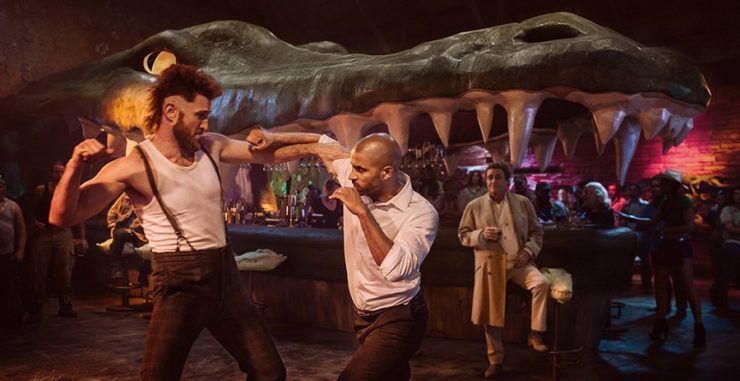American Gods is everything prestige television has dreamed of becoming, and then some. It is simultaneously a lurid nightmare, a gorgeous daydream, scintillating mythology, and brutal reality. It’s a story filled with contemptuous lies and hard truths, a harrowing journey to a constantly shifting destination, and an intellectual power play disguised as evocative entertainment.
It is, in short, a goddamn miracle.
The premiere opens with a “Coming to America” prologue written by Mr. Ibis (Demore Barnes). A boatful of Vikings run aground on an inhospitable slice of North America. After several blood-tinged sacrifices, the men successfully summon their god of war (known by countless names including Wanderer, Sleep Bringer, Broad Hat, Weather Maker, One Eyed, Overthrower, God of Prisoners, Swift Tricker, and, of course, Odin). The Allfather brings enough wind to carry his worshipers back home, leaving him behind.
Shadow Moon (Ricky Whittle), a man who keeps slipping into dream/magical planes filled with god-like creatures and bone trees, is released from prison a few days early after a fatal car crash claims his wife, Laura (Emily Browning). On the trip back to Eagle Point, Indiana, he encounters a bewildering old man who tells Shadow to call him Mr. Wednesday (Ian McShane). Wednesday offers Shadow a job that Shadow immediately turns down. Shadow rents a car to drive the rest of the way home, only to run into Wednesday in the bathroom of a dive bar. Shadow fights Mad Sweeney (Pablo Schreiber), a tall, red-headed Irishman with a coin fetish who claims to be a leprechaun. He gifts Shadow a coin with a sun on its face as a prize for fighting him.
Bilquis (Yetide Badaki), a beautiful Black woman, meets an older white man (Joel Murray) on a date during Mr. Ibis’ “In America” interlude. At first Bilquis looks haggard; her hair is untidy and her expression a little sad, but she turns passionate as Mr. Paunch feeds her with ecstatic praise. During an energetic round of sex, he is literally consumed by her, thrusting so deeply that he slips inside her. By the end of her conquest she looks as fresh and supple as a twentysomething.
At Laura’s funeral, Audrey (Betty Gilpin), the wife of Shadow’s friend and boss Robbie who also died in the crash, reveals to Shadow that Laura and Robbie were having an affair. Shadow makes his peace with Laura at her graveside later that night and tosses the sun coin onto her grave. On his way back to the hotel, he’s abducted by the Technical Boy (Bruce Langley). The arrogant little brat demands to know what Wednesday is up to, and when Shadow refuses to comply the boy orders his faceless goons to kill him. Before they succeed, an unseen figure slaughters the goons in a gory battle.

If you’ve never read American Gods the book, you can still watch the show without missing too much. (Alright, so that’s a total lie, but at least you won’t know what you’re missing until you know what you’re missing.) Like a god brought to the New World, the show requires the book to exist but builds its own life through new rules and intentions. In the book, realism bleeds into magic in a way that feels gradual, immediate, and ever-present, and showrunner Bryan Fuller has translated that from page to screen in incredible, evocative fashion. He really is the only showrunner working today who could do something so, well, magical.
Fuller puts a lot of thought and effort into Frankensteining the beating, bloody, broken heart of the book for television. He boils down whole plot points into a few thematic moments: the Vikings slaughtering each other to appease Odin, which is mirrored at the halfway mark when Mad Sweeney and Shadow punch the everliving crap out of each other much to Mr. Wednesday’s childlike delight, then echoed again first when Shadow is battered by the faceless goons and yet again when the The Children are massacred by an unknown assailant.
But he also weaves new scenes by stitching together fragments of key themes scattered across the book. Take the invented-for-television scene of The Children hanging Shadow. There is the mythology—Odin hanging from Yggdrasil for nine days and nights as a sacrifice to himself to gain runic knowledge—but also something much crueler and more American underlying this moment: Shadow, a Black man, is strung up by faceless men dressed in all white. He’s hanged in Indiana, a state that was more or less Ku Klux Klan HQ during its early 20th century resurgence. By the mid 1920s, 250,000 Hoosiers were members of the KKK, including the governor. The most notorious lynching was that of Thomas Shipp and Abram Smith, two young Black men strung up in Marion, Indiana, in 1930. Their deaths were immortalized first in a photograph and later inspired the song “Strange Fruit.” (In the novel, when Shadow dreams of the tree in the bone orchard, he mentions the “strange fruit” hanging from its boughs.)

Visually, American Gods owes as much to Pushing Daisies as it does to Hannibal. Here, the violence combines the technicolor garishness of Pushing Daisies and the visceral grotesqueness of Hannibal. The show also has Wonderfalls and Dead Like Me’s proclivity for having characters who tend to mean much more than they actually say and who often say things that are open to myriad interpretations. Jaro Dick is the set decorator here and was brought over from Hannibal, which explains why American Gods sets look so freaking good. Same with the music—Brian Reitzell was the man responsible for the heart-pounding, soul-shattering music in Hannibal and brings the same sinister sounds to American Gods. I think my favorite musical beat was the swelling, romantic instrumental that plays over Shadow’s farewell speech at Laura’s grave. It’s almost sarcastic in its saccharine earnestness.
Fuller also has an eye for casting. Ricky Whittle is a revelation as Shadow. Shadow is a man who, as future episodes will prove, is a very difficult character to portray. If the premiere is any indication, Whittle will do just fine. Ian McShane is also perfectly cast as Wednesday, so much so that it’s his voice I now hear in my head while re-reading Gaiman’s book.
Bilquis is the perfect example of Fuller’s skill, however. He is a master at shooting respectful yet sexy sex scenes. Bilquis writhes naked, breasts and body on full display, yet Fuller never reduces her sexuality to pornography, nor does he shoot her as an object meant for the male gaze. Bilquis’ pleasure is hers and hers alone. We are witnesses to an ancient rite, not voyeurs or peeping toms.
Likewise with Audrey—her interactions with Shadow are terrifyingly heartbreaking. Gilpin plays her as a rageful, grieving widow who wants to scorn Robbie and Laura as much as she misses them. When she tries to give Shadow a blowjob, it’s as much to seek comfort for her own grief as it is to get one final dig at the friends who broke her soul. She hates that her husband and best friend humiliated and abandoned her as much as she loves and needs them, which is why she straddles Shadow on the headstone. Though she spouts obscenities there’s nothing obscene about her behavior. It’s not that she wants sex, but that she’s desperate for closure and sees revenge as her only way out. For Fuller, sex isn’t a tool for titillation but a means for deeper characterization.

Plot is almost incidental to American Gods, both the novel and the show. Yet both also steer clear of one of the biggest peak TV pitfalls: puzzles. The reason everything is happening, who the main groups are and what they want, how it’s all going to turn out—all of it is there in the first episode if you know where to look. But even if you can’t see the answers for the details, it doesn’t matter because putting the emphasis on knowing why misses the point. It’s about the experience and the way the story makes you feel rather than unlocking the secrets of the universe. Things happen because they do, because they’re meant to, because they must. Gods work in mysterious ways. American Gods unfolds glacially but without games, ploys, or shock value. You cannot rush a folktale any more than you can rush the truth, and American Gods, the story and the show, is both.
The novel on which the series is based would be, in hands other than Bryan Fuller’s, utterly unfilmable. Fuller is the only showrunner working today who could not just wrangle nearly 250,000 words (they relied on Gaiman’s preferred text rather than the original published version of the novel) and not butcher it into unrecognizability. Not only did he base the show off of a sprawling, meandering novel spanning eras, continents, and pantheons, but he also expands underwritten characters and invents out of whole cloth new scenes and characters that manage to stay true to the novel while also updating the text. If you’d asked me a decade ago if I thought Gaiman’s American Gods could be improved with a television adaptation, I would’ve laughed until I went hoarse, but here we are. And it’s all thanks to Bryan Fuller and his incredible team.

Music
- “Torture”—Kris Jensen
- “Iko Iko”—Dixie Cups: This the the ultimate American song. It contains Creole, French, Yoruba, Pidgin, and Chickasaw words (and maybe even Ewe and Ashanti) with dozens of possible origins and interpretations varying mostly based on the phonetic interpretation of each linguistic group. And the song itself is a nonsense tune with words borrowed from confrontations between New Orleans Mardi Gras Indian tribes and mashed together, stripped of context until they sound good but are totally meaningless. It’s a melange of a song where the sum and the parts are both greater and lesser than each other. Gaiman uses the Anglicized lyrics in Chapter Two of the book.
- “In the Pines”—Danny Farrant and Paul Rawson: A folk song dating back to at least the 1870s and made famous by Leadbelly. It’s another classic American hodgepodge, with lyrics alternating depending on the singer—from Georgian convicts working in the Appalachian coal mines to a train decapitating one of its passengers to a Black girl who either runs away or dies in the woods to a young woman trading to a miner her virtue for fine clothes. It reveals the true nature of America by revealing nothing at all.
- “Midnight Special”: I’m not sure who does the guitar instrumental version in the show, but Leadbelly is one of the most famous performers. It’s yet another traditional American folk song, this one originating from prisoners in the South, likely as a work song for convicts on lease (most of whom were Black). Leadbelly recorded it in Angola Prison in Louisiana, a former plantation converted into one of the worst prisons in the states. A stanza from this song opens Chapter Four in the book.
- If Sonny Terry and Brownie McGhee’s “God and Man” doesn’t end up in season 1, I’m gonna be mighty disappointed.
Alex Brown is a teen librarian, writer, geeknerdloserweirdo, and all-around pop culture obsessive who watches entirely too much TV. Keep up with her every move on Twitter and Instagram, or get lost in the rabbit warren of ships and fandoms on her Tumblr.










